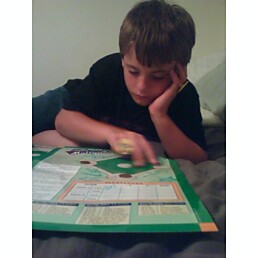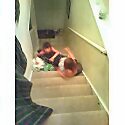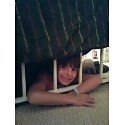
This was an email I sent to my parents Saturday night. I've always said, "Send me 20 students or 200, I'll love and teach them all." This is my way of sharing strategies and insights to any parents who might be able to use it.
Parents (and Partners),
I'm playing math games tonight with my own kids and doing some thinking about yours. Unless the class averages 90% or higher on assessments I'm not satisfied with my teaching and wondering what I could do better or differently. Exponents gave alot of kids trouble. If your child had trouble with exponents try some of the following games:
Roll two different colored dice: one color is the base number and the other is the exponent. Let's say the green dice comes up 4 (base number). The white dice comes up 2 (exponential number). Your child should say "Ah-hah. 4 * 4 = 16."
The same thing can be done with playing cards in several different ways. Each player puts 2 cards from their hand face up. The card on the left is the base number and the card on the right is the exponent; highest resulting number (product) wins the hand.
For those having trouble with multiplication, try this. Tonight my son and I played a dice and ball game on the stairs, but with multiplication. We took turns rolling 3 dice, multiplying all 3 numbers (factors) and when he got the correct answer (the product) he and I took turns seeing who could land bouncing balls on the highest step. He is motivated by play and not by school. He got every roll correct because he was "playing".

We also played "Multiplication Baseball". Even my daughter and I played although she hasn't done multiplication yet (3rd grade). She still figured out how to do it by thinking of "what are three 6's" v. "what is 6*3?"
She and I also played on the stairs only we added 2 of the dice and subtracted the third from that. This went well until the stairway was turned into a fort by her 4-year-old sister :-)


Many more games specific to what we are studying can be found in your child's Student Reference Book (SRB). Look in the index under "games". I dug around in my things at home and found game mats for these that your son or daughter can sign out and take home. Also, have your child take their Study Links book home and rip out the letters to parents that contain the answers. Use them to check their work and to recognize where they could use reinforcement using the games.
The trick is to figure out how your child's brain "sees" knowledge. This happens in their recognition brain network. If their brains can't recognize the new knowledge then their strategic brain network can't solve problems using this new knowledge. Every single one of your children has genius inside of them. History shows only about 10% of them ever fully develop it. My goal is 100% of them will; and I'm a pretty stubborn man once I set an important goal like this one.
"We either find a way, or make one." – Hannibal
Adam Stuart
Writer & 5th Grade Teacher
Sand Lake ELementary
Orlando, Florida
"By passionately believing in that which does not exist, we create it."
3 comments:
Hi Adam, Wish I had a math teacher like you when I was growing up! Math was the bane of my existence and, unfortunately, still is. Having gone to 14 schools, you can imagine how inconsistent the teaching was and although the nature of the other subjects allowed me to easily catch up, math’s constructive nature was not so kind. I tell my children that they must get two things out of school (ok, I tell them more than two things, but I’ll be happy if they master these); be able to logically express an idea or opinion all the way through a written/oral report and understand math. Math comes effortlessly to my son, but not to my daughter. While doing homework last week, I used a different technique with her based on something you said. She was very upset after I checked her work and she saw she had gotten about half of her math problems wrong. Tearfully, she started in with her “I’m bad in math” lament. Before she could get too worked up, I stopped her and said, “But look at all the ones you got right! Let’s see what you did to get them right, and then do the same thing to the ones that you didn’t get right.” It worked beautifully. Her focus shifted to what she had accomplished and not to what she considers herself “bad” at. Once again I am reminded that focusing on our successes instead of our “failures” is the best approach to not only math, but life. J
awesome techniques. i've always been "bad at math", but the 2 times i've had good, committed teachers i've thrived! my first time in calculus i failed, and if an F- were possible, I would've had it. My 2nd tme around with someone who made it relevant, I got an A+ ... go figure! Thanks to you and all the other teachers who take the time to TEACH! Speaking of which...Patrice is a very lucky boy to have someone like yourself supporting him, not every child is fortunate enough to have a cheerleader like yourself!
WOW! You make Math seem so effortless. I was doing fine in Math until I had a teacher that didn't care. That was my first year of Algebra 1. I had Intro to Algebra the year before and did great and the first semester of this class I was doing well when one of the other Math teachers in the school had a health problem and had to retire immediately. That meant that my teacher took over his classes and they found a new teacher for ours. Well, he wasn't a very good teacher, that's for sure. I don't think I learned anything else about Algebra for the rest of the year and I was afraid of it after that. I have to say, you make me feel like with the right support and the right teaching, I could still learn it. (I never have taken College Algebra - even though it was a requirement, and it has kept me from going back to college.)
Cindy
Post a Comment